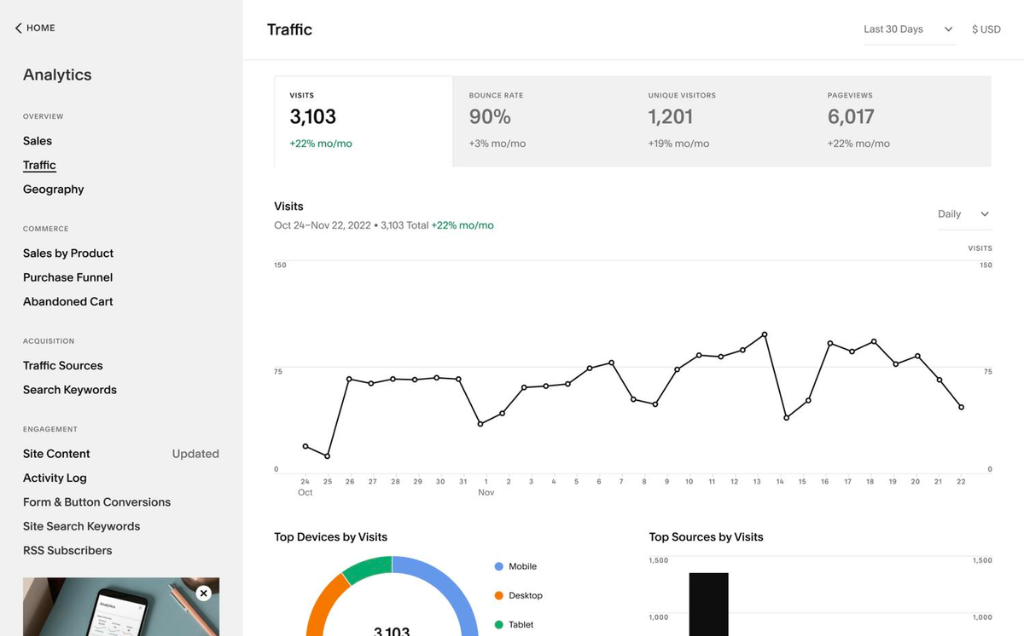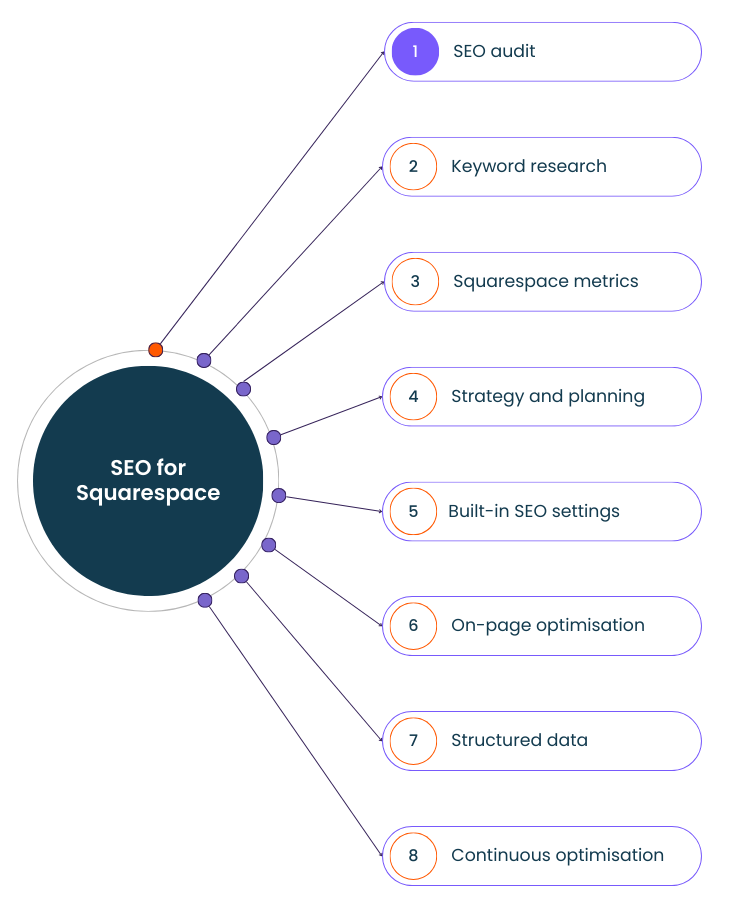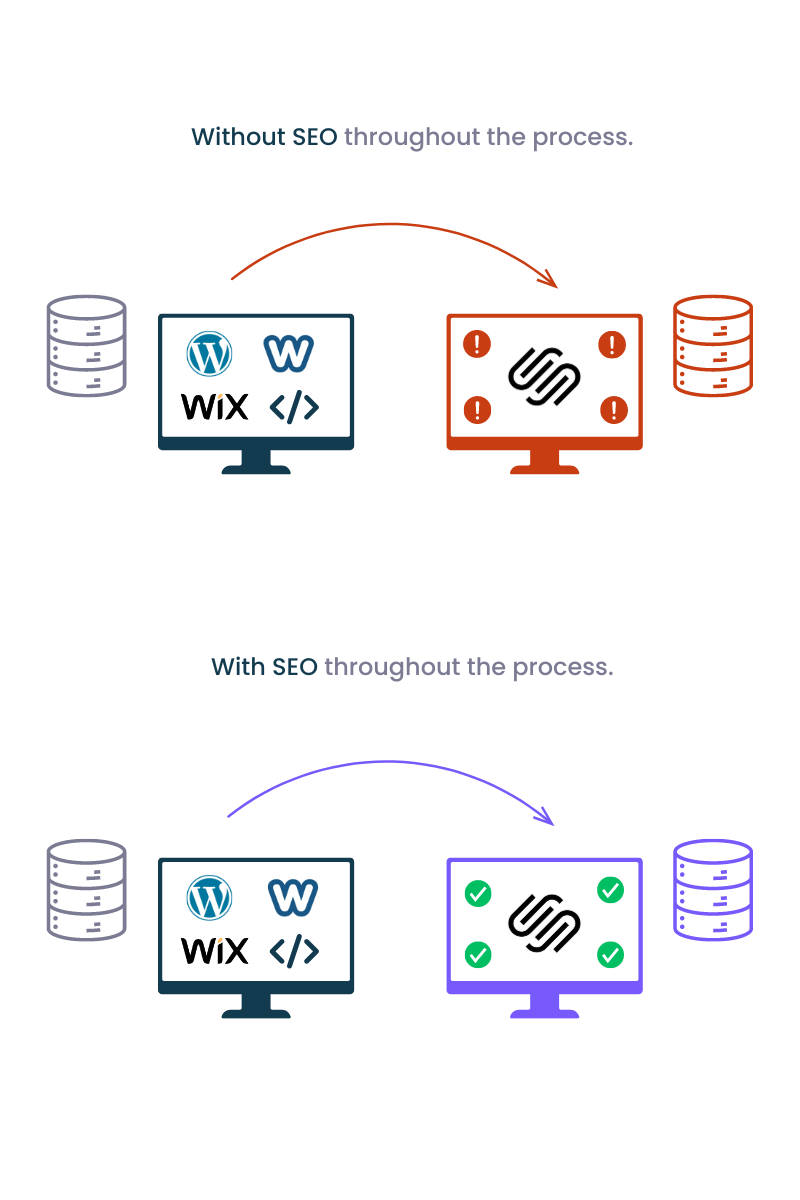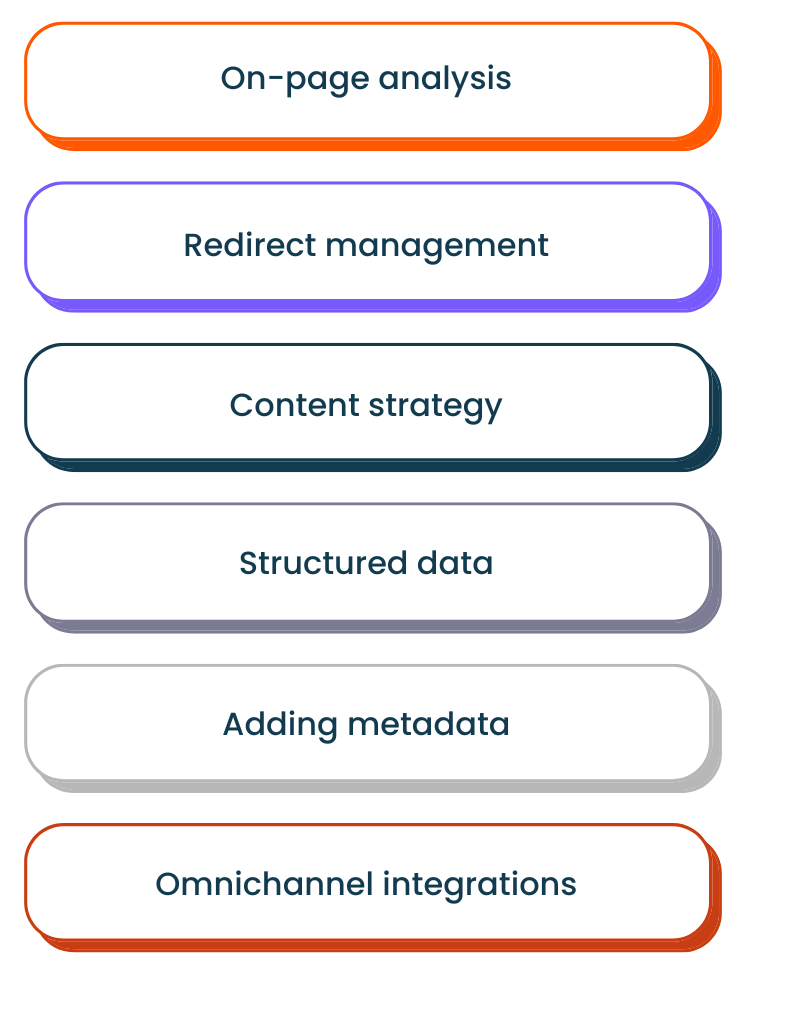"I have worked with Growthack for just over a year now, utilising their expertise, advice and management of our SEO and PPC channels. They are a real pleasure to work with, clearly experts in their field and have had an enormous impact on the quality and volume of traffic to our SaaS product."
Squarespace SEO for large organisations
We specialise in optimising Squarespace websites and employing transparent SEO services to improve search engine visibility.
Squarespace is one of the most popular website builders and content management systems (CMS) used by over a million websites. Since themes automatically include well-structured HTML and site architecture, creating a site with solid SEO foundations is easier than a fully custom build.
Is Squarespace good or bad for SEO?
There are reasonable arguments on both sides of whether Squarespace is “good” or “bad” for SEO, with certain tradeoffs to consider.
Pros of using Squarespace
- Quick and easy to build a nice-looking, mobile-responsive site.
- Templates automatically include decent information architecture.
- Built-in SEO settings check some initial boxes like meta fields.
- Helps get a new site launched faster.
Cons of using Squarespace
- Limited customisation abilities hinder advanced optimisation.
- Potential technical SEO issues with migrations/redesigns as changed URLs need proper redirects
- Can’t customise markup or underlying code
- E-commerce functionality requires add-on purchases.
The conclusion
Squarespace is good for basic SEO needs but may cause issues down the road once efforts require more customisation and control, especially for e-commerce sites.
Many websites start on Squarespace but later invest in migrating to WordPress, Shopify or custom site builds once the business has grown and SEO / conversion optimisation needs have advanced beyond Squarespace’s core capabilities.

Trusted by leading organisations
Nicholas, Global Fintech SaaS Company
“I approached Growthack already knowing of their capabilities from previous engagements- and once again, they have delivered. The LinkedIn campaign framework and management have played a key role in VOSS’ growth”
Debbie, VOSS
Fix your Squarespace SEO for better ROI
Get Started
8 SEO strategies for Squarespace
While Squarespace makes website creation easy, it still requires some effort to optimise a Squarespace site for search engines. Here are 8 key SEO strategies to improve your Squarespace site’s search ranking.
Squarespace SEO audit
Site architecture – Ensure your site has a clear information architecture and structure, with logically organised pages and navigation. Avoid overly complex or deep navigation hierarchies.
Page titles and metadata – Check that every page has unique, descriptive titles and meta descriptions that use targeted keywords. These appear in search results.
URL structure – URLs should be short, keyword-optimised and avoid excessive dynamic parameters.
Images- Check image file sizes are compressed, and add descriptive alt text and title attributes to images.
Speed – Test your site speed and aim for page load times under 2-3 seconds. Enable caching in Squarespace to help.
Indexing – Check your site is fully indexed in Google Search Console, and resolve any crawl errors.
Duplicate content – Avoid publishing duplicate or thin content pages. Use canonical tags if needed.
Structured data – Implement schema markup to better inform search engines about your content.
Keyword research
Thorough keyword research is required to identify high-value terms and phrases that align with your offerings and target audience search intent. Useful keyword research activities include:
- Review which keywords are driving existing traffic to your site using Squarespace Metrics and Google Analytics. Expand on these.
- Use Google’s Keyword Planner and other tools to find new relevant keyword ideas around products/services, location, and customer needs.
- Identify long-tail versions of your primary keywords for specific pages and content. These generally convert better as they indicate strong user intent.
- Group keywords into themes for different site sections, categories and pages. This helps develop an effective content strategy.
- Compile your primary and secondary keywords into a spreadsheet or keyword tracking tool. Update this regularly.
Analyse site search queries in Squarespace metrics
Reviewing the search queries people are using in your Squarespace site search can provide insight into visitor intent and the topics they are seeking. To do this:
- In Squarespace metrics, go to traffic trends > site search to view search queries.
- Review popular queries driving conversions/revenue to identify new opportunity keywords.
- Analyse any high impression but low click queries – these indicate problematic search result pages.
- Identify common misspellings or typos to add as keywords and improve the search experience.
- Export search queries to analyse in Excel, highlighting common themes and topics to cover.
- Add relevant missing pages, content or products for commonly searched terms.
- Use search queries to create clusters of keywords for new content pillars.
Content strategy and planning
An effective content strategy is required to attract and engage your target audience. Useful approaches include:
- Audit existing content – identify gaps, outdated or thin content to improve.
- Produce keyword-optimised content for priority pages and related long-tail keywords. Include these naturally in titles, URLs, headlines and body copy.
- Create pillar pages with depth of content around important topics and keywords. Link other content to these hubs
- Refresh old content by expanding text, adding related links, updating sources, images and video.
Leverage Squarespace's built-in SEO settings
Squarespace provides several built-in settings specifically for SEO.
- Enable ‘show in search engines’ in site Settings so search engines can index all pages.
- Add a search engine description to succinctly summarise your brand and content for search snippets.
- Submit XML sitemaps using Squarespace’s automatic sitemap generator for better indexing.
- Block pages or items you want excluded from search results, like archived content or login pages.
- Set preferred domain settings to ensure search engines prioritise your primary domain name.
- Enable canonical site links so duplicate content across domains doesn’t dilute search performance.
- Add campaign parameters to track traffic from advertising channels for reporting.
- Use robots.txt file to guide search engine crawling of your site.
Squarespace on-page optimisation
- Include primary keywords in the first paragraph for priority pages to improve rankings.
- Use keywords naturally in URLs, intro paragraphs, headlines, and captions. Don’t over-optimise.
- Structure content using headings (H2, H3, etc) to indicate topics and break up texts.
- Link out to authority sources from body copy to build trust and relevancy.
- Interlink related content together using relevant anchor text keywords.
- Keep important pages higher in navigation hierarchy for greater crawl priority.
Structured data/schema markup within Squarespace
Adding structured data improves how your pages appear in SERPs. Squarespace lets you implement schema markup like:
- Event schema – for webinars, conferences, meetups, classes etc.
- Recipe schema – for food blogs, cooking sites.
- Product schema – for online stores, enhances product snippets.
- Article schema – for blog posts and articles.
- FAQ schema – for product support and visitor questions.
- Review schema – for product/service reviews.
- Breadcrumb schema – to indicate page hierarchy.
- Site navigation schema – describes your site structure.
- Video schema – for embedded videos on pages.
- Local business schema – for contact info, location etc.
- Author schema – outlines content author profiles.
The Squarespace Developer Platform allows you to insert JSON-LD structured data into the <head> of pages without needing to edit code.
Ongoing Squarespace SEO optimisation
SEO is a continuous activity that applies to all CMS platforms, not only Squarespace. Here are some recommendations to help you keep your Squarespace SEO in good shape.
- Monitor your site metrics in Squarespace and Analytics to identify issues.
- Keep refreshing and adding new content regularly around your core keywords.
- Stay up to date with Squarespace feature releases that can impact SEO.
- Keep pages loading quickly. Check site speed regularly and optimise images.
- Review indexed pages in Search Console for any crawling issues.
- Keep link building to increase referral traffic and domain authority over time.
- Update existing content and deprecate old stale content that attracts little traffic.
- Review analytics and add redirects for any 404 errors.
- Expand long-form content for priority keywords and topics.
By continually refining and enhancing your Squarespace SEO strategy over time, you can steadily grow your organic search presence, traffic and conversions.
Need help with Squarespace site?
Get StartedSquarespace migrations from other CMS
When migrating over to Squarespace from another platform like WordPress or Shopify, extra SEO precautions must be taken to protect your organic traffic and rankings.
Conduct a technical SEO audit of the old site first. This prevents carrying over discoverability issues to the new CMS. Changing domain names or page URLs without proper redirecting will result in a massive loss of all SEO equity earned over time.
Leverage the Squarespace redirect manager plugin to
- 301 redirects old site pages to relevant new locations
- Redirect major directories like /blog/ to new URLs
- Redirect old site-wide URLs like contact-us to /contact
This maintains link authority and page rank passed to optimised pages. When rebuilding pages in Squarespace.
- Migrate over well-performing blog content
- Shift key landing pages like services and location pages
- Re-establish site architecture and internal linking
Even with precautions taken, migrations often create short-term ranking volatility until shifts stabilise. Page-specific monitoring will quickly diagnose losses.
- Leverage rank checkers to track page positions
- Review Google Search Console data trends
- Check organic traffic changes in analytics
By taking precautions to preserve SEO equity, strategically rebuilding page content, as well as tracking search visibility impacts, you can migrate to Squarespace smoothly without losing organic traffic. Combining smart redirects, optimised on-page content, and link equity transfers will ensure a positive transition.

Let's have a brief call to discuss how we could help
Get Started
Role of an SEO consultant in optimising Squarespace website
An SEO specialist will guide your overall organic search strategy, planning, and execution in ways that maximise Squarespace’s built-in capabilities. One of the priorities is having an SEO expert conduct comprehensive technical and on-page audits.
- Core web vitals metrics – page speed, TTFB, accessibility etc.
- Platform-specific technical factors – XML sitemap, crawling errors, plugin issues
- Information architecture flows – site structure and internal link mapping
- On-page optimisation consistency – titles, metadata, alt text usage
- Content gaps – readability, formatting, media enhancements
- Link equity analysis – a ratio of follow vs nofollow links
The right SEO consultant will guide you in implementing key technical factors like:
- XML sitemap activation
- Robot.txt optimisation
- Page indexation controls
- URL redirect manager
Proper technical configuration removes quick roadblocks to pages getting crawled and indexed appropriately.
Get direct access to a Squarespace SEO specialist
Clicks, conversions, sales — growth’s the name of our game. Talk to us about your big ambition and we’ll take it from there.
Send us a brief


Your results, our expertise.
We’ve received multiple awards and recognitions for our team, clients, and partners. View our awards.

European recognition with the best agencies in the UK and abroad. Wish us luck at the awards event in May 2024!

Our ability to optimise ad budget allocation has returned impressive outcomes with the integration of digital data in shaping product decisions.

We are beyond proud of this recognition from one of the most prestigious search awards for our work with Ampa LLP

Address: Growthack Ltd, 31 Park Row, Nottingham NG1 6FQ
About Growthack
Copyright © 2020 – 2024. Registered in England and Wales No. 12868240.
VAT Reg GB392684357.





